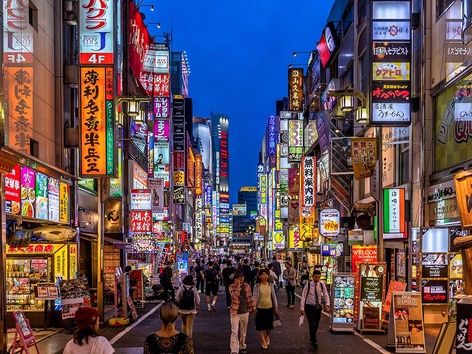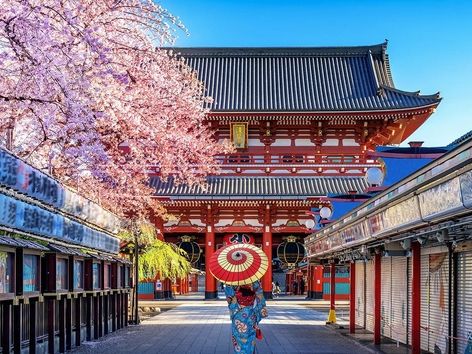Important Things to Know Before Traveling to Japan in 2024

Travelling to Japan is a unique experience. It is a country that impresses with its culture, traditions and modernity. Find out more about the important nuances that will make your trip to Japan enjoyable and unforgettable
When planning a trip to Japan, pay attention to a few important things. From the absence of garbage cans in cities to the rules of etiquette, we have collected the most important nuances. First of all, be prepared to walk a lot. Also, learn the basics of Japanese etiquette, pay attention to the little things and enjoy the local culture. Don't worry, we will support you on this amazing journey! According to statistics, most foreigners come to Japan from China, India, Taiwan and Korea.
If you're planning a trip to Japan, use the guides from Visit World. These documents contain basic advice on visa applications, border crossing, employment, citizenship, and much more.
Prepare to do a lot of walking
Exploring Japan on foot is the most immersive way to experience the beauty and energy of the country. Whether you're heading to bustling metropolises like Tokyo or Kyoto, where every step reveals a new experience, or exploring ancient temples and shrines, the vast majority of your time will be spent walking from one wonderful place to another.
First of all, take care of comfortable shoes. Do not experiment with new pairs of shoes, as this can cause discomfort. It's better to be prepared for anything.
Start your journey calmly, without putting too much pressure on yourself on the first day. Allow your body to adapt and then increase your activity gradually. This will help you enjoy every moment without feeling tired.
If you have limited time, prepare in advance by doing a workout before you leave. That way, you'll be ready for any adventure on your first day and can make the most of your time. May your adventures in Japan be filled with discovery and joy at every step!
Insufficient number of seats
When travelling in Japan, you may find that the lack of seating in public places is a real challenge. This country is known for its high population density, which means that you will often have to stand rather than sit, even on public transport. On trains and buses, it can be particularly difficult to find a seat during peak times.
To reduce the amount of standing, you can use some strategies. For example, avoid travelling during rush hours or holidays when more people are out and about. You should also consider boarding the bus at an early stop or choosing early morning journeys when traffic is less.
Be prepared for the fact that travelling in Japan may require a little more standing than you're used to. However, this is also part of the unique experience that gives you a better understanding of the culture and daily life of the country.
Insufficient number of rubbish bins on the streets
When you arrive in Japan, you will quickly notice that there are not as many trash cans in public places as you are used to seeing in other countries. This is a testament to the great emphasis placed on personal responsibility and cleanliness in Japanese culture.
In Japan, every citizen is expected to be responsible with their rubbish by taking it with them and disposing of it properly at home. This is one of the reasons why Japanese cities are always so well maintained and clean.
Before you start your adventure in Japan, it is important to get rid of unnecessary things that can become litter during the day. Bringing a special bag or container for rubbish with you will help you dispose of it properly when you get back to your hotel or home.
Remember that cleanliness is not only a cultural trait, but also a sign of respect for the environment and your fellow travellers. So follow the rules and don't litter!
Avoid travelling with a lot of luggage
When travelling in Japan, you should pay special attention to the choice of luggage. Carrying a large suitcase can be a real challenge, especially in densely populated cities and subways.
Many metro stations may have problems with lifts, especially during peak hours when they are crowded with tourists and passengers with large luggage. Also, keep in mind the tactile pavement, which can make it difficult to move with large items.
On the Sinkansen high-speed train, storing large luggage can be a challenge. Even if you pay extra for storage, it may not be the most convenient option.
For convenience, you can opt for a backpack or smaller suitcase, which will make it much easier to move around the city and on public transport. Or you can use a luggage delivery service, which will free you from the need to carry it yourself.
When choosing your luggage, it is important to pay attention not only to its size, but also to the ease of carrying it, so that your trip to Japan is comfortable and enjoyable.
The predominance of cash in the money supply
Credit cards are becoming more and more popular in Japan, but there are still many places, especially in the countryside, that accept cash only. Therefore, it is always worth having cash with you.
When travelling, you will probably need to have a lot of coins as they are widely used in the country. It is recommended that you carry a coin bag with you so that you can use them at the appropriate time, for example to pay for travel on local buses, which often only accept cash.
Many ticket machines at train and metro stations also do not accept credit cards, but instead accept IC cards, such as the Suica Card. So it's always a good idea to have cash with you, which can come in handy in such situations.
Many places close early
In Japan, many places close early, especially in places like Nikko, where restaurants can close as early as 6-7pm, even in the summer months. So it's a good idea to check closing times before heading out for lunch or dinner, especially if you're not in a big city.
Cable cars, for example in Hakone and on Miyajima Island in Hiroshima, also close quite early, around 4:30pm. Plan your visit in advance to avoid getting stuck on a mountain with no way down.
Queues can be another obstacle, especially in touristy places, so you should consider waiting times. Find out about closing times and plan your time so that you can catch all the events you have planned.
Book everything in advance if possible
In Japan, due to the large flow of tourists, you often have to spend time waiting in lines, even to take a simple photo. For example, to take a picture at the iconic Torii Gate in Hakone, you need to prepare for an hour-long wait. However, is a few likes on social media really worth spending an hour on one photo?
Many tourist attractions have solved this problem by introducing a booking system and time slots. This allows you to effectively manage the flow of visitors and keep attractions in good condition.
However, popular places like Shibuya Sky are often booked too quickly. To visit this place, it is better to make a reservation a week in advance, and for the "golden hour" - a month in advance. Other places like teamLAB Planet in Tokyo and Universal Studios in Osaka require advance booking.
The editors of Visit World recommend using the Work Guide for Japan for a comfortable and safe trip.
The guide is a detailed written document that contains basic advice on obtaining a visa, crossing the border, getting a job, citizenship, and much more. More details at the link.
Recommended articles
2 min
Popular
Japan earthquake: the number of victims and how to protect yourself
A massive earthquake has hit Japan, destroying buildings and sparking fires. This natural disaster is recognized as the most powerful in the country in recent years. Find out more about the earthquake's impact, casualties, and safety tips
09 Jan. 2024
More details2 min
Work
Highly skilled professional visa in Japan (HSP) 2025: conditions, points, documents
The Japanese government has a highly skilled foreign professional entry system to attract talent to the country. The Japanese visa for highly skilled professionals is issued on a points system to foreigners who meet certain criteria. Find out how to get a Japanese visa for highly skilled professionals in 2025: updated requirements, points system, list of documents and tips for processing
12 Jun. 2025
More details2 min
Education
Studying in Japan in 2025: A Detailed Guide for International Students
Studying in Japan is becoming increasingly attractive to international students. The country offers high quality education and is known for its innovation, cultural richness and hospitality. However, moving to another country to study can be a complex process that requires detailed planning and preparation. Find out more about how to study in Japan in 2025
06 Feb. 2025
More details2 min
Travels
Where to celebrate Easter in Europe: a selection of the best places
Easter is one of the most important Christian holidays celebrated in many European countries. It's a great opportunity to spend time with your family while traveling. Find out more about the best places to go to celebrate Easter in Europe
10 Mar. 2024
More detailsAll materials and articles are owned by VisitWorld.Today and are protected by international intellectual property regulations. When using materials, approval from VisitWorld.Today is required.
